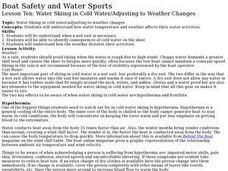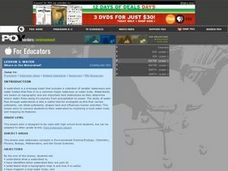Curated OER
Landforms and Bodies of Water
A simple activity helps your learners with geographic terms. This could be used as a template for future worksheets which have learners identify some geographic terms, then complete an essay about one of the terms.
Curated OER
Amounts of Dissolved Oxygen in Various Bodies of Water
Young scholars test water to determine the dissolved oxygen content while displaying the proper use of testing instruments while visiting water testing sites. They determine if the amount of dissolved oxygen is appropriate for the tested...
Curated OER
I Am A Rock, I Am An Island: Describing Landforms and Bodies of Water
Students identify common landforms and bodies of water from descriptions of distinguishing features. In this landforms and bodies of water lesson plan, students describe the features they see in the pictures given to them.
Earth Day Network
Conserving Water Through Art!
Having fresh, clean drinking water is a privilege many people take for granted. Help raise awareness about the scarcity of water and the importance of conservation by discussing different ways water is used in everyday life. Brainstorm...
Curated OER
Animal Survival - Water and Waste
Here is a very simple set of slides to complement your lecture about the importance of water for animals. It includes a table of where we gain liquid from, the chemical reaction for aerobic respiration, how we lose water, and how ADH and...
Curated OER
Watershed Tourist
Students recognize and categorize different bodies of water. In this watershed and water environments lesson, students "Follow the Water from Brook to Ocean." Students define the different bodies of water and sort from smallest to...
Curated OER
Understanding the Water Cycle
Investigate the water cycle and how water moves from the land to the air and back to the land. Create a terrarium and observe the water cycle at work. Define weather terms including evaporation, condensation, and precipitation.
Curated OER
Map of Pennsylvania's Waters
In this labeling bodies of water in Pennsylvania learning exercise, students observe a map outline of the state with water sources and use the word bank of names of creeks, lakes, reservoirs, and rivers to identify them. Students label...
Curated OER
Bodies of Water
Learners investigate the geography of the Earth by identifying bodies of water. In this global geography lesson, learners read a list of bodies of water which they must identify in a word scramble.
Curated OER
What Are The Properties of Sea Water?
Ninth graders conduct research on the subject of sea water. They use a variety of resources to obtain information. There are helpful resource links listed in the lesson. In conjunction with the research students make inquiry of the...
Houghton Mifflin Harcourt
Nature Walk: English Language Development Lessons (Theme 2)
Walking in nature is the theme of a unit designed to support English language development lessons. Scholars look, write, speak, and move to explore topics such as camping, woodland animals, instruments, bodies of water, things found at a...
Curated OER
Boat Safety and Water Sports - Lesson 10 - Cold Water/Weather
Lesson 10 is part of a twenty-two instructional activity unit on boat safety and water sports. It focuses on how to handle cold water and cold weather when water skiing, as well as what to do if hypothermia or frostbite occur. Click on...
Curated OER
Boat Safety and Water Sports - Lesson 9 - Conditioning for Water Skiing
It takes muscle strength and muscle endurance to get up on a water ski or wake board, and to stay up. Lesson 9 out of this 22 lesson unit is about conditioning. A resource link at the bottom of the page allows you to view all the lesson...
Curated OER
Summer Body Activity: A Nose Workout
Students have sensory experiences with the sweet smell of discovery. For this early childhood science lesson, students use their sense of smell as they create and compare their very own fragrance essences with a variety of provided...
Outside Education
Water Cycle Adventure
Evaporation, transpiration, condensation, precipitation, accumulation. Steam, clouds, rain, lakes. Guide your class members on an imaginary journey through the water cycle with a water cycle adventure script.
PBS
Reading Adventure Pack: Oceans
Flotsam by David Wiesner and The Magic School Bus on the Ocean Floor by Joanna Cole, illustrated by Bruce Degen, begin a reading adventure pack focusing on oceans. With story listening and thoughtful discussion, scholars complete several...
Curated OER
Learning About Watersheds
In this learning about watersheds worksheet, students answer 15 questions using links to web resources about water use in their community. This page includes numerous links to helpful websites.
NOAA
A Watery World
With about 70% of the earth's surface covered in oceans, it's fair to say that we live in a very wet world. Young scientists gain a better appreciation of this fact as they use maps to identify the world's ocean basins in the first...
Curated OER
Water Pollution Lesson Plan: What's the Flow?
Learners study urban runoff. They identify the urban runoff in a simulated area and determine peak flows using charted data. Finally, they discuss possible causes of the differences in flow rates.
Curated OER
Wet Water, Dry Land
Students observe and examine relationship between landforms and bodies of water, recognizing differences between them. Students then define island, peninsula, isthmus, archipelago, lake, bay, straight, system of lakes, and identify land...
Curated OER
Major American Water Routes
Sixth graders locate and identify the major bodies of water and waterways in the United States. Through a simulation activity, they describe how early explorers would have described their surroundings. Working in groups, they create...
Curated OER
Testing the Waters
Eleventh graders examine a local body of water. In this science lesson, 11th graders collect water samples to test. Students analyze the data and make conclusions. Students create tables and graphs of the data.
Curated OER
Water: Where in the Watershed?
Students become connected to their watershed by exploring a local water body and mapping its features. They focus on how the local watershed fits into the larger scheme of the watershed.
Curated OER
Kids Conserve? Water Preserved
Sixth graders review the steps of the water cycle. Individually, they calculate the amount of water they use in a day and identify ways they can conserve. As a class, they discuss how conserving water today helps future generations and...

























